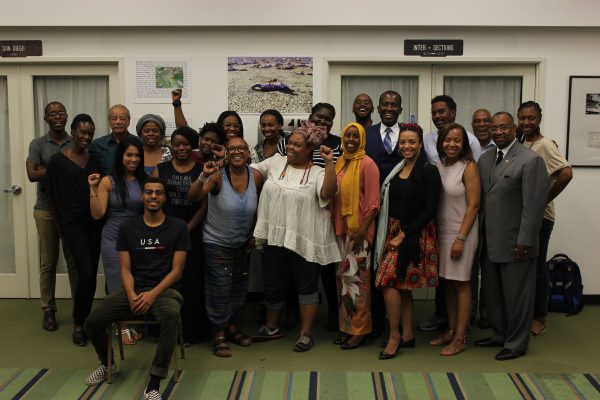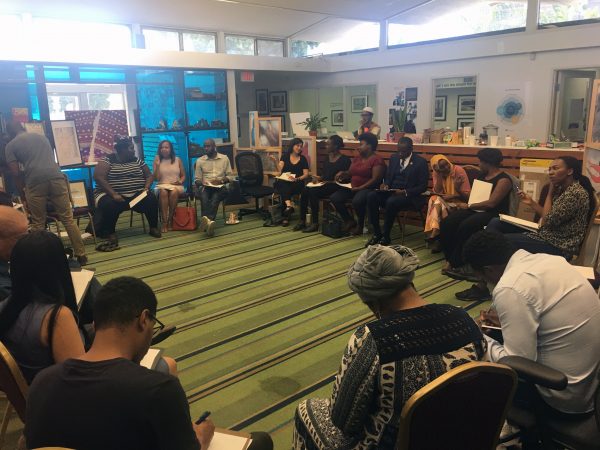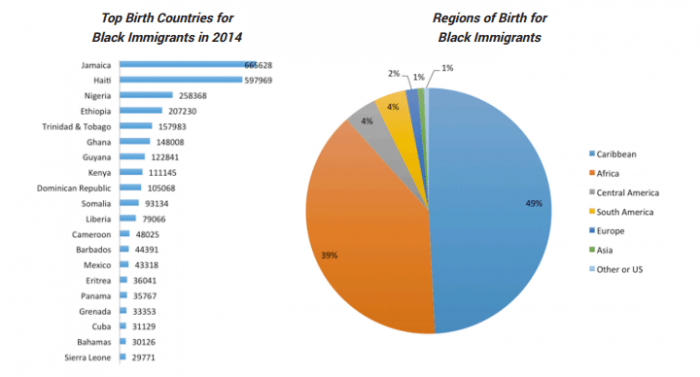

Organizers and activists at the convening. Photo provided by BAJI
Here is another side of the U.S immigration issue that is unseen and many times ignored. Black immigrants are also fleeing violence, persecution and economic crisis from their own countries.
When they arrive to the United States, they too face many challenges. Some of them are the lack of services to be able to stay in the U.S and what they go through in the criminal justice and immigration systems.
As a result of the lack of attention, different organizations are urging other communities to use their voices to focus more on this issue.
This past July, 40 community leaders, organizers, activists and attorneys gathered together in San Diego near the U.S-Mexico border to address an issue few seem to care. The three-day convening was the first-black led border delegation in the U.S., according to the Black Alliance for Just Immigration (BAJI).
Latino Rebels spoke to BAJI and one of the grassroots organizations that participated on the delegation, Haitian Bridge Alliance.
“The needs of many Black immigrants are being unmet. Most of them do not have the legal support or there are no organizations with staff that speak their languages,” BAJI’s Deputy director, Carl Lipscombe said during an interview.
According to a report done by BAJI and the NYU Law Immigrant Rights Clinic, there is a record estimate of 3.7 million Black immigrants living in the United States.
Close to half of all Black immigrants in the U.S. come from the Caribbean. About 4% of Black immigrants come from South America and another 4% are from Central America.
A Pew Research Center study estimated that about 575,000 Black immigrants were living in the U.S. without authorization in 2015. That is about 16% of total Black immigrant population.
According to the BAJI report, Black immigrants are more likely to face deportation than any other group due to a criminal conviction. “Black people are arrested at 2.5 times the rate of whites,” the report said. “The government’s increasing focus on immigrants with criminal records disproportionately impacts Black immigrants.”
The purpose of the July convening was to activate different organizations to “commit to work on some joint public education work, releasing a report about black immigrants at the border and doing community outreach on social and traditional media,” Lipscombe added.


Organizers at the convening. Photo provided by BAJI
At the meeting, leaders identified different problems that organizations need to address, aside from the difficulties that the criminal justice system brings to these immigrants. They concluded that legal and housing support and ESL classes are crucial when immigrants arrive.
“Those people came here to contribute to the economy and to be part of our community. They are ready to work, to learn and to provide here and back home,” President of the Haitian Bridge Alliance Guerline Jozef told Latino Rebels.
The non-profit organization has assisted 3,000 Black immigrants this year—offering employment readiness trainings, guidance on how to obtain a driver license and legal support.
“When people referred to immigrants, first thing that comes to mind is a person of Mexican descent. This a misconception. This is a global issue,” Jozef added.
This delegation hopes to meet again later this year to start developing new policies and get more organizations to support Black immigrants and to “get folks to understand there is a crisis and to push them to commit,” Lipscombe said.
***
María Camila Montañez is a journalism student at CUNY Graduate School of Journalism’s Spanish-language program. She is originally from Colombia and tweets from @mariacmontanez.



